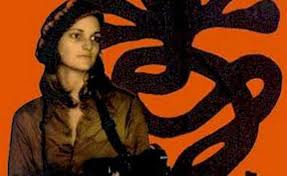



Patricia Hearst was born on February 20th, 1954, an American newspaper heiress, later to become a socialite, an actress, a kidnap victim, and a convicted bank robber. She is the granddaughter of publishing magnate William Randolph Hearst, and great-granddaughter of millionaire George Hearst. She gained notoriety in 1974 when, following her kidnapping by the Symbionese Liberation Army (SLA), she ultimately joined her captors in furthering their cause.
On February 4th, 1974, the nineteen year old Hearst was kidnapped from the Berkeley, California, apartment she shared with her fiancé, Steven Weed, by a left-wing urban guerrilla group called the Symbionese Liberation Army. When the attempt to swap Hearst for jailed SLA members failed, the SLA demanded that the captive's family distribute seventy dollars worth of food to every needy Californian, an operation that would cost an estimated $400 million.
On April 3rd, the SLA released a tape with Hearst saying that she’d joined their fight to free the oppressed, and that she had even taken a new name. Twelve days later, she was spotted on a bank surveillance camera wielding an assault weapon during an SLA bank robbery, barking orders to bystanders and providing cover to her confederates. Meanwhile, the FBI had launched one of the most massive, agent-intensive searches in its history to find Hearst and stop the SLA. Working with many partners, they ran down thousands of leads, but with the SLA frightening potential informants into silence, using good operational security, and relying on an organized network of safe houses, it was tough going.
Hearst later alleged that she had been held in close confinement, sexually assaulted, and brainwashed. In response, Hearst's father arranged the immediate donation of $6 million worth of food to the poor of the Bay Area. After the distribution of food, the SLA refused to release Hearst as they deemed the food to have been of poor quality. On April 3rd, 1974, Hearst announced on an audiotape that she had joined the SLA and had assumed the name "Tania.”
A break finally came in Los Angeles, on May 16th, when 2 SLA members tried to steal an ammunition belt from a local store and were nearly caught. The getaway van was discovered, which led authorities to an SLA safe house. The next day, the house was surrounded by L.A. police and a massive shootout ensued. The building went up in flames and six members of the SLA died in the blaze, including DeFreeze.
Hearst and several others escaped and began traveling around the country to avoid capture. FBI agents, though, were close behind. They finally captured her in San Francisco on September 18th, 1975, and charged her with bank robbery and other crimes.
“Patty Hearst” (1988), starring Natasha Richardson and William Forsythe.